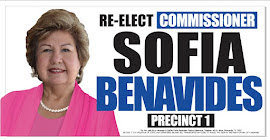
Part 3
By Juan Montoya
Cameron County District Attorney Luis V. Saenz took office on January 1, 2013 riding the crest of a moral wave against eight-liner gambling establishments (maquinitas) under a cloak of religious morality using the catchy name of "Operation Bishop."
He then convinced his counterparts Willacy and Hidalgo County to follow suit and hound the operators of the establishments claiming they were dens of iniquity operated by ""seedy" individuals who were mere fronts for money laundering, crime and drug cartel activity.
On April 2013, and standing before the county courthouse, Saenz drew his line on the concrete against the maquinitas and vowed to confiscate the machines and use a steam roller to destroy them.
He said his naming of the operation after a catholic prelate was circumstantial.
"It got to me second hand that the bishop had visited our county judge (Carlos Cascos) and had implored on him to do something because his collections had fallen down on Sundays and that's understandable," he laughed.
"So when it came around to pick a name for the operation, we said, well, why not Operation Bishop? It was a catchy name and it just stuck. I am very proud of that...we started in April and within a matter of four or five months we had shut down the vast majority of them. I'm very proud to say that we were able to do in a matter of months what other administrations hadn't been able to do in years."
After months of positive newspaper and television coverage augmented by his own website and Facebook page that heralded the exploits of the maquinita raiders and showed customers (mostly elderly retirees) lined up and herded off to be booked for frequenting a gambling establishment, the luster is beginning to wear off.
Later, he added a wrinkle to the raids and sought to forfeit the property if owners allowed eight-liners to operate in their rentals.
Operators merely moved to the dirt-poor communities in Starr County or went underground to operate in eight-liner arcades that operate surreptitiously in unmarked gaming rooms. A county worker said his mother ans sisters play daily.
"They're everywhere," he said. "They don't see anything wrong is spending time with their friends and spending $20 to get together."
Likewise, a local attorney said that he head learned that despite Saenz's media blitz, his mother had let it slip that she went to Sane Benito where an eight-liner arcade was operating.
"I don't want my mother to get arrested for playing the maquinitas with her friends," he said.
Likewise, an elected official in a local school district said her retired mother and her friends were angry at Saenz for taking away their daily recreation at the maquinitas.
 "They say the DA should be going after the real criminals, not them," she said. "They'll never vote for him again."
"They say the DA should be going after the real criminals, not them," she said. "They'll never vote for him again."As if that wasn't enough, at least two local communities have cited the economic boost that the eight-liner arcades have brought to their poverty-stricken communities after Saenz and his Willacy County coiunterparts moved aggressively to drive them out of their jurisdictions.
La Joya and Sullivan City on the western part of Hidalgo County abutting Starr County where the maquinitas flourish have legalized the arcades and approved regulations for the eight-liner establishments.
The move may make Sullivan City more than just a pit stop between La Joya and Starr County. Both already have regulated eight-liners.
"Right now, with the way it is in Rio Grande, we've seen a lot of traffic," said police Chief Miguel Martinez, referencing the cars that speed through Sullivan City on the way to game rooms in Rio Grande City.
Martinez said police have talked to drivers from all over the Rio Grande Valley who travel to Starr County to play eight-liners.
"They've been coming all the way from Edcouch, Elsa,” Martinez said, adding that police stop many who don’t obey the speed limit. "They come from San Benito. Even from McAllen."La Joya, for example, collected more than $120,000 after approving regulations for eight-liners last year.
For a community whose total property tax revenue totals $762,000, having an establishment with $100 brings in $403,700 every year. The city collects an annual $2,500 "amusement redemption machine premises permit fee" and a $300 quarterly fee from every game room, plus a $1,000 per-machine quarterly payment.
So far, the city has issued permits for 368 machines, according to city records. At least three paid cash.
For a little town with a limited property-tax base, that cash ain't nothing to sneeze at.
Sullivan City plans to hand out a dozen permits, which will cost $3,000 each, said City Manager Judy Davila. Along with the permit payment, Sullivan City will collect $1,000 per machine every quarter.
A legal eight-liner operation would pay the city a $3,000 permit fee, a $1,000 fee per machine every quarter and a $500 monthly fee.
Anyone with a permit may operate a maximum 100 machines, meaning a maxxed-out game room would pay the city $400,000 annually.
Has Saenz painted his future political career into a corner by aggressively prosecuting a past time that not only customers, but cash-strapped municipalities apparently want to continue? Carlos Masso, his opponent in the last DA's election, and who Saenz painted as pro-eight liner, is already aggressively seeking that post again.
With the maquinita momentum swinging against Saenz, will he continue to ride that sinking ship?
Next: When You Sleep With Dogs, You Catch Fleas..."
Next: When You Sleep With Dogs, You Catch Fleas..."









1 comment:
He will be a 2 face and ease up in hopes of re-election. Not gonna happen buddy. When you go against your constituents they don't forget
Post a Comment